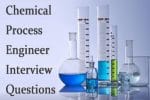Chemical Process Engineer Interview Questions and Answers
Chemical process engineers also called process engineers are chemical engineers who work on the creation and manufacturing of chemicals such as pharmaceuticals. They take part in the research, development, testing and evaluation of manufacturing process. Day to day duties of chemical process engineer vary depending on the industry. Process engineers can be employed in companies of any size, as most companies must find ways to make their chemical processes more efficient , cost effective, and compliant with environmental and safety regulations. Read below some frequently asked Chemical Process Engineer interview questions and answers.
1 Q: What are the important activities of a chemical engineer?
A: Some of the important activities of a chemical engineer are to perform intimately with process chemist as well as management engineers to make sure that the production unit is ready to produce maximum output with effective operation, to ensure all possible safety issues concerning the process operator and environment, to engage in upgrading and troubleshooting activities etc. You should read the job description before appearing for the interview. It will help you in answering this question very well.
2 Q: What is a chemical reactor?
A: A chemical reactor is a device which is used to contain controlled chemical reactions. Reactions take place inside the reactor, in conditions which can be monitored and controlled for safety and efficiency. These types of reactors are used in the production of chemicals such as components of pharmaceutical compounds, and they can operate in several different ways.
3 Q: What are the factors that come under operation cost?
A: The operating cost comprises many factors including energy input, raw material cost, energy removal, labor etc.
4 Q: What is electro catalyst?
A: An electro catalyst is a catalyst that participates in electrochemical reactions. Catalyst materials modify and increase the rate of chemical reactions without being consumed in the process. Electro catalysts are a specific form of catalysts that function at electrode surfaces or may be the electrode surface itself. The electro catalyst assists in transferring electrons between the electrode and reactants and facilitates an intermediate chemical transformation described by an overall half reaction.
5 Q: What is Deacon reaction?
A: The deacon process is a process used during the manufacture of alkalis by the Leblanc process. Hydrogen chloride gas was converted to chlorine gas, which was then used to manufacture a commercially valuable bleaching powder, and at the same time the emission of waste hydrochloric acid was curtailed. The reaction takes place at about 400 to 450 degree Celsius in the presence of a variety of catalysts including copper chloride.
6 Q: Define entropy.
A: Entropy, a measure of the disorder in a system containing energy or information. The less ordered a system is, the greater is its entropy. In thermodynamics, entropy is given in terms of the heat transferred to or from a substance at a given temperature.
7 Q: Explain the third law of thermodynamics
A: The third law of thermodynamics is essentially a statement about the ability to create an absolute temperature scale, for which absolute zero is the point at which the internal energy of a solid is precisely 0. Three potential formulations of the third law of thermodynamics are
- it is impossible to reduce any system to absolute zero in a finite series of operations.
- The entropy of a perfect crystal of an element in its most stable form tends to zero as the temperature approaches absolute zero.
- As temperature approaches absolute zero, the entropy of a system approaches a constant.
8 Q: What is the difference between horizontal and vertical heat exchanger?
A: The main difference between horizontal and vertical heat exchanger is residence time fluid which flow in horizontal heat exchanger gets more residence time as compared to vertical heat exchanger.
9 Q: What is the difference between unit operation and unit process?
A: A pure unit operation involves only a physical change examples drying, size reduction, distillation, filtration etc. where as in general unit operation involves physical and chemical change. And a unit process is a number of unit operations grouped together in a manufacturing system.
10 Q: Why should we hire you?
A: It is time to prove yourself as a suitable fit for the organization. Describe about your knowledge, skills and experience in order to stand apart from other candidates. However, you should remember, not to repeat what you have already said. Say in a positive and confident tone so as to impress the interviewer.
Categories: Job Interview Tags: Chemical Process, Engineer Interview, Interview Question Answers

